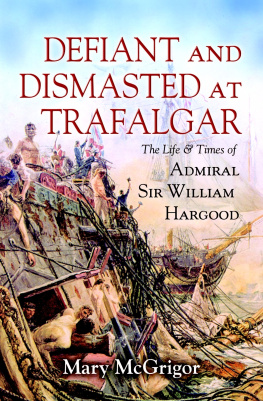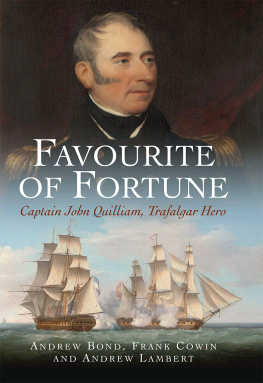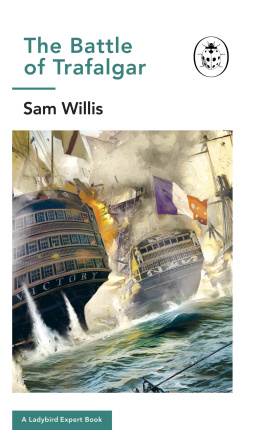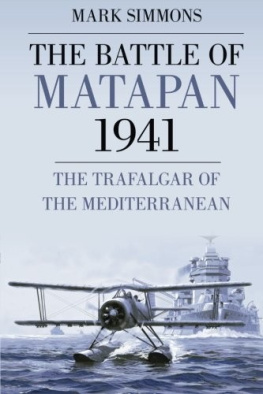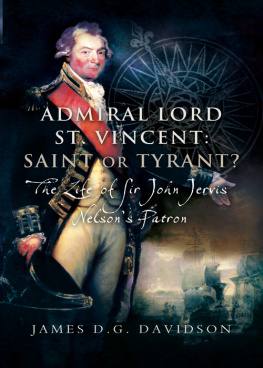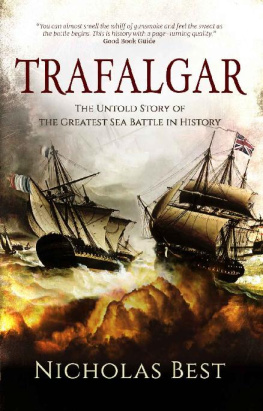Appendix
WHAT THE PAPERS SAID!
Newspaper reports differed amazingly according to which country they belonged. The Gibraltar Chronicle wrote:-
By H.M. ship the Belleisle , which arrived here from the fleet on the 24th instant, totally dismasted, we have learnt some further particulars of this glorious victory. Having first described in outline how the battle was fought, it then described the fates of the French and Spanish ships. The Argonauta , a Spanish ship of 80 guns, struck to her [the Belleisle ] of which she took possession, sending the master and sixty seamen on board of her. The second captain of the Argonauta , who is now prisoner on board the Belleisle says that the ship had 950 men when the action commenced, of which nearly 400 were killed or wounded before she struck her colours. The first captain [de Alava] was severely wounded and left in the ship.
Villeneuve he states to have been the commander-in-chief of both squadrons, and Admiral Gravina to have commanded the Spanish fleet. He heard that Admiral Gravina, whose flag was hoisted on board the Prince of Asturias , was severely wounded in the left arm, and that three of four hundred of the crew were killed or wounded. The Victory we are informed, had sixty men killed and wounded, and lost her mizenmast and foretopmast. The Royal Sovereign lost her main and mizenmasts, and some other ships are also dismasted; but in general our gallant fleet has suffered much less than might have been expected in an action so glorious and decisive, and where the loss of the enemy has been so tremendously great.
We have also the inexpressible satisfaction to learn that there is every reason to believe that the fears entertained for the safety of our disabled ships, and those of the enemy in our possession, are unfounded, as they were seen at anchor on the Spanish coast after the late gales of wind had abated; and there is cause to believe that we shall shortly be gratified in beholding those splendid trophies of our victory safely moored in Gibralter Bay.
The Algeciras Gazette contains the official account of the line of battle of the combined squadrons on the day of their sailing, from which it appears that there were eighteen French ships of the line and fifteen Spanish, in the action of the 21st; of which eleven have found their way back to Cadiz, namely five French ships, names unknown, and the following six Spanish ships Principe de Asturias , Rayo , Justo , Leandro , Montanez , and Francisco de Asis .
Though it is highly honourable to the bravery of the Spanish nation, we most sincerely regret to find that the loss, both in ships and men, on this occasion has chiefly fallen on them; they were unwillingly dragged into this contest by their good and faithful allies the French, who, as usual, were the first to fly and desert them in the middle of the action; it appearing from every account that four of the French ships were seen running away from the fight about two hours and a half after the battle began.
Napoleon remains the prime example of a single-minded man of genius who could never, under any circumstances, admit to being in the wrong. Within his conquered countries publications of all descriptions were censored.
The first bulletin of the Grand Army, from the Moniteur , as it appeared in the Herald Headquarters, Cadiz, on 25 October 1805, is as remarkable for its audacity, and contortion of the truth as it is for the inventive imagination of its author.
HOW THE ENGLISH LOST TRAFALGAR
From the Naval Chronicle of 1805.
The operations of the Grand Naval Army second in the Atlantic those of the Grand Imperial Army in Germany. The English fleet is annihilated! Nelson is no more! Indignant at being inactive in port, whilst our brave brethren in arms were gaining laurels in Germany Admirals Villeneuve and Gravina resolved to put to sea and give the English battle. They were superior in number, 45 to our 33; but what is superiority of numbers to men determined to conquer? Admiral Nelson did everything to avoid the battle, he attempted to get into the Mediterranean, but we pursued and came up with him off Trafalgar.
The French and Spaniards vied with each other who should first get into action. Admirals Villeneuve and Gravina were both anxious to lay their ships alongside the Victory , the English Admirals ship. Fortune always so constant to the Emperor, did not favour either of them. The Santissima Trinidada was the fortunate ship. In vain did the English Admiral try to avoid an action; the Spanish Admiral Oliva prevented his escape and lashed his vessel to the British Admiral. The English ship was one of 136 guns, the Santissima Trinidada was but a 74. Lord Nelson adopted a new system; afraid of combating us in the old way, in which he knows we have superiority of skill, as was proved by our victory over Sir Robert Calder, he attempted a new mode of fighting. For a short time they disconcerted us; but what can long disconcert his Imperial Majestys arms? We fought yard-arm to yard-arm, gun to gun. Three hours did we fight in this manner; the English began to be dismayed they found it impossible to resist us; but our brave sailors were tired of this means of gaining victory, they wished to board; the cry was A la bordage ! Their impetuosity was irresistible. At that moment two ships, one French and one Spanish, boarded the Temeraire . The English fell back in astonishment and affright. We rushed to the flag-staff, struck the colours, and all were so anxious to be the bearers of the intelligence to their own ship that they jumped overboard; and the English ship, by this unfortunate impetuosity of brave sailors and their allies, were able by the assistance of two more ships that came to her assistance to make her escape in a sinking state.
Meanwhile Nelson still resisted us. It was now who should first board and have the honour of taking him, French and Spanish? Two Admirals on each side disputed this honour. They boarded his ship at the same moment. Villeneuve flew to the quarterdeck. With the usual generosity of the French, he carried a brace of pistols in his hands, for he knew the Admiral had lost his arm and could not use his sword. He offered one to Nelson. They fought, and at the second fire Nelson fell. He was immediately carried below. Oliva, Gravina and Villeneuve attended him with the accustomed humanity.

